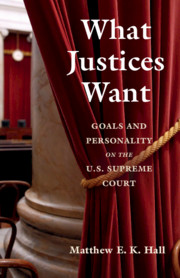Book contents
- Frontmatter
- Dedication
- Contents
- List of Figures
- List of Tables
- Acknowledgments
- 1 Who They Are and What They Want
- 2 Goals and Personality
- 3 Measuring Justice Personality
- 4 Agenda Setting
- 5 Opinion Assignments
- 6 Intra-Court Bargaining
- 7 Voting on the Merits
- 8 Separate Opinions
- 9 Behind the Black Robes
- Appendix A Agenda-Setting Analysis
- Appendix B Opinion Assignment Analysis
- Appendix C Intra-Court Bargaining Analysis
- Appendix D Voting on the Merits Analysis
- Appendix E Separate Opinion Analysis
- Notes
- Index
1 - Who They Are and What They Want
Published online by Cambridge University Press: 22 August 2018
- Frontmatter
- Dedication
- Contents
- List of Figures
- List of Tables
- Acknowledgments
- 1 Who They Are and What They Want
- 2 Goals and Personality
- 3 Measuring Justice Personality
- 4 Agenda Setting
- 5 Opinion Assignments
- 6 Intra-Court Bargaining
- 7 Voting on the Merits
- 8 Separate Opinions
- 9 Behind the Black Robes
- Appendix A Agenda-Setting Analysis
- Appendix B Opinion Assignment Analysis
- Appendix C Intra-Court Bargaining Analysis
- Appendix D Voting on the Merits Analysis
- Appendix E Separate Opinion Analysis
- Notes
- Index
Summary
On November 1, 1962, Estelle Griswold, the executive director of the Planned Parenthood League of Connecticut, and Charles Lee Buxton, the head of obstetrics and gynecology at Yale University, opened a clinic in New Haven, Connecticut. The clinic was one of several that Planned Parenthood had opened in Connecticut over the prior few decades. Like the other clinics, this one's purpose was to provide birth control information to married couples and dispense contraceptives to married women.
Within days of opening the clinic, Griswold and Buxton were arrested for violating an 1879 Connecticut statute, which prohibited any person from using “any drug, medicinal article or instrument for the purpose of preventing conception.” Violators could be fined or imprisoned for up to a year, and Connecticut law stated that “[a]ny person who assists, abets, counsels, causes, hires or commands another to commit any offense may be prosecuted and punished as if he were the principal offender.” Griswold and Buxton were found guilty as accessories to violating the anti-contraceptive statute and fined $100 each. The Appellate Division of the Circuit Court and the Supreme Court of Errors in Connecticut both affirmed their convictions, so Griswold and Buxton appealed their case to the US Supreme Court.
When Griswold and Buxton opened the clinic in New Haven, they were well aware of the anti-contraceptive statute. In fact, one of their goals in opening the clinic was to provoke a legal action that would allow them to challenge the archaic Connecticut law. Though once fairly common in the United States, Connecticut's 82-year-old ban on contraceptives was one of only two such laws still in place in 1961. In the preceding decades, several doctors and patients had brought challenges to the law, but those challenges had failed on procedural grounds. In the most recent case, Poe v. Ulman, Buxton and his patients had asked the Supreme Court to invalidate the statute, but their lawsuit was deemed unripe because the law had not actually been enforced against them. With their arrest and conviction, Griswold and Buxton were now positioned to directly challenge the constitutionality of the anti-contraceptive law.
- Type
- Chapter
- Information
- What Justices WantGoals and Personality on the U.S. Supreme Court, pp. 1 - 12Publisher: Cambridge University PressPrint publication year: 2018



